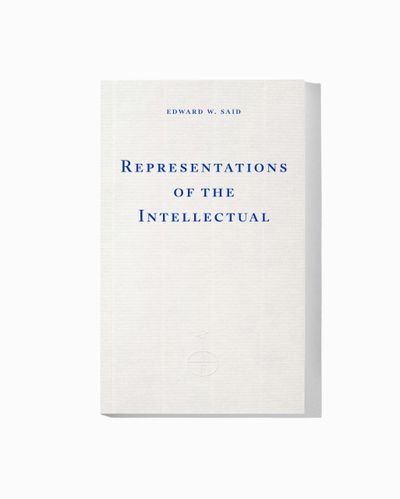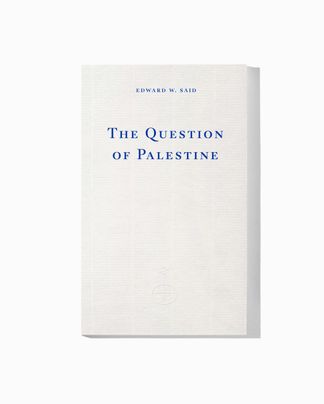Are intellectuals merely the servants of special interests or do they have a larger responsibility? In these wide-ranging essays, one of our most brilliant and fiercely independent public thinkers addresses this question with extraordinary eloquence. Said sees the intellectual as an exile and amateur whose role it is ‘to speak the truth to power’ even at the risk of ostracism or imprisonment. Drawing on the examples of Jonathan Swift and Theodor Adorno, Robert Oppenheimer and Henry Kissinger, Vietnam and the Gulf War, Said explores the implications of this idea and shows what happens when intellectuals succumb to the lures of money, power, or specialization.

Representations of the Intellectual
Preface by Isabella Hammad
Fitzcarraldo Classic No. 12 | French paperback with flaps, 146 pages
Published 15 January 2026
Representations of the Intellectual
Preface by Isabella Hammad
¶ There is no equivalent for the Reith Lectures in the United States, although several Americans, Robert Oppenheimer, John Kenneth Galbraith, John Searle, have delivered them since the series was inaugurated in 1948 by Bertrand Russell. I had heard some of them over the air – I particularly remember Toynbee’s series in 1950 – as a boy growing up in the Arab world, where the BBC was a very important part of our life; even today phrases like ‘London said this morning’ are a common refrain in the Middle East. They are always used with the assumption that ‘London’ tells the truth. Whether this view of the BBC is only a vestige of colonialism I cannot tell, yet it is also true that in England and abroad the BBC has a position in public life enjoyed neither by government agencies like the Voice of America nor by the American networks, including CNN. One reason is that programs like the Reith Lectures and the many discussion and documentary shows are presented by the BBC, not so much as officially sanctioned programs, but as occasions that offer listeners and viewers an impressive range of serious, often distinguished material.
I was therefore very honored to be offered the opportunity by Anne Winder of the BBC to give the 1993 Reith Lectures. Because of scheduling problems we agreed on a date in late June rather than the customary January time slot. But almost from the moment that the announcement of the lectures was made by the BBC in late 1992 there was a persistent, albeit relatively small chorus of criticism directed at it for having invited me in the first place. I was accused mainly of being active in the battle for Palestinian rights, and thus disqualified for any sober or respectable platform at all. This was only the first in a series of plainly anti-intellectual and antirational arguments, all of them ironically supporting the thesis of my lectures about the public role of the intellectual as outsider, ‘amateur’, and disturber of the status quo.
These criticisms do in fact reveal a great deal about British attitudes to the intellectual. Of course these are attitudes imputed to the British public by journalists, but the frequency of their repetition gives these notions some current social credibility. Commenting on the announced themes of my Reith Lectures – Representations of the
Intellectual – a sympathetic journalist states that it was a most ‘un-English’ thing to talk about. Associated with the word ‘intellectual’ was ‘ivory tower’ and ‘a sneer’. This depressing train of thought is underlined by the late Raymond Williams in Keywords. ‘Until the middle twentieth century unfavourable uses of intellectuals, intellectualism and intelligentsia were dominant in English’, he says, ‘and it is clear that such uses persist.’
One task of the intellectual is the effort to break down the stereotypes and reductive categories that are so limiting to human thought and communication. I had no idea of the limitations to which I was subject, before I gave the lectures. It was often said by complaining journalists and commentators that I was a Palestinian, and that, as every-
one knew, was synonymous with violence, fanaticism, the killing of Jews. Nothing by me was quoted: it was just supposed to be a matter of common knowledge. In addition, I was described in the sonorous tones of The Sunday Telegraph as anti-Western, and my writing focused on blaming the West for all the evils of the world, the Third World especially.
What seemed to have completely escaped notice was everything I had actually written in a whole series of books, including Orientalism and Culture and Imperialism. (My unforgivable sin in the latter is my argument that Jane Austen’s Mansfield Park – a novel I praise as much as I do all her work – also had something to do with slavery and British-owned sugar plantations in Antigua, both of which of course she mentions quite specifically. My point was that just as Austen talks about goings-on in Britain and in British overseas possessions, so too must her twentieth-century reader and critics, who have for too long focused on the former to the exclusion of the latter.) The construction of fictions like ‘East’ and ‘West’, to say nothing of racialist essences like subject races, Orientals, Aryans, Negroes and the like, were what my books attempted to combat. Far from encouraging a sense of aggrieved primal innocence in countries which had repeatedly suffered the ravages of colonialism, I stated over and over again that mythical abstractions such as these were lies, as were the various rhetorics of blame they gave rise to; cultures are too intermingled, their contents and histories too interdependent and hybrid, for surgical separation into large and mostly ideological oppositions like Orient and Occident.
Even well-meaning critics of my Reith Lectures – commentators who seemed to have a real acquaintance with what I said – assumed that my claims for the intellectual’s role in society contained a veiled autobiographical message. What about right-wing intellectuals like Wyndham Lewis or William Buckley, I was asked? Why, according to you, must every intellectual be a man or woman of the Left? What was not noticed was the fact that Julien Benda, whom I rely on (perhaps paradoxically) with some frequency, was very much of the Right. In fact the attempt in these lectures is rather to speak about intellectuals as precisely those figures whose public performances can neither be predicted nor compelled into some slogan, orthodox party line, or fixed dogma. What I was trying to suggest was that standards of truth about human misery and oppression were to be held to despite the individual intellectual’s party affiliation, national background, and primeval loyalties. Nothing disfigures the intellectual’s public performance as much as trimming, careful silence, patriotic bluster, and retrospective and self-dramatizing apostasy.
The attempt to hold to a universal and single standard as a theme plays an important role in my account of the intellectual. Or rather the interaction between universality and the local, the subjective, the here and now. John Carey’s interesting book The Intellectuals and the Masses: Pride and Prejudice Among the Literary Intelligentsia
1880–1939 appeared in America after I had written my lectures, but I found its on the whole dispiriting findings complementary to mine. According to Carey, British intellectuals like Gissing, Wells, and Wyndham Lewis detested the rise of modern mass societies, lamenting such things as ‘the common man’, suburbia, middle-class taste; instead they promoted a natural aristocracy, ‘better’ earlier times, high-class culture. For me the intellectual appeals to (rather than excoriates) as wide as possible a public, who is his or her natural constituency. The problem for the intellectual is not so much, as Carey discusses, mass society as a whole, but rather the insiders, experts, coteries, professionals who in the modes defined earlier this century by pundit Walter Lippmann mold public opinion, make it conformist, encourage a reliance on a superior little band of all-knowing men in power. Insiders promote special interests, but intellectuals should be the ones to question patriotic nationalism, corporate think- ing, and a sense of class, racial or gender privilege.
(…)
‘For all that’s changed, Said’s principles for a worthwhile intellectual life – in particular, remaining independent despite the financial temptations offered by governments or institutions, and being relentlessly honest, whatever the risks – are as vital as ever.’
— Juliet Jacques, Novara Media
‘This slim volume is another edifying representation of a beautiful mind sorely missed in the media, especially during the devastation of Gaza.’
— NJ McGarrigle, Irish Independent
‘What is the task of the intellectual at a time when, at the heart of liberal democracies, genocide is normalized and protest suppressed?… Said understood that the intellectual’s position is not easy to occupy, certainly not with any kind of consistency. There is no template, and no guarantee that the intellectual’s willingness to put themselves on the line will make a difference in the short term. Because they cannot trust institutions, states, or religions, conscience must be their guide. But the resonance of Said’s books in our particular moment – the fact that they matter in certain respects now even more than they did at the time of their composition – shows that short-term calculus is not always the most relevant measure of their value. Sometimes, the intellectual must also look to the future.’
— Rebecca Ruth Gould, Los Angeles Review of Books
‘Representations of the Intellectual is a masterly meditation on some of the most important questions with which intellectuals must grapple, notably their relation to power and their responsibility to speak the truth out of a commitment to a bedrock of universal values. It speaks of such issues in a way that is satisfying and at the same time whets the reader’s appetite for more, surely the sign of an important work.’
— Rashid Khalidi, author of The Hundred Years’ War on Palestine
‘Edward Said defines a corrective way to think about politics, drawing an urgent and absolutely necessary line between individual responsibility and authority of consensus.’
— Joan Didion
‘Edward Said helps us to understand who we are and what we must do if we aspire to be moral agents, not servants of power.’
— Noam Chomsky
‘Edward Said is that rare sort of intellectual who is able to illuminate even the stormiest of human prospects with serene, often revelatory, light that shows us not only the obligatory two sides to every question, but the often overlooked third dimension as well.’
— Gore Vidal
‘Edward Said is among the truly important intellectuals of our century.’
— Nadine Gordimer
‘When Edward Said died in September 2003, after a decade-long battle against leukemia, he was probably the best-known intellectual in the world…. Over three decades, virtually single-handedly, he wedged open a conversation in America about Israel, Palestine and the Palestinians. In so doing he performed an inestimable public service at considerable personal risk.’
— Tony Judt
‘[A]rguably New York’s most famous public intellectual after Hannah Arendt and Susan Sontag, and America’s most prominent advocate for Palestinian rights.’
— Pankaj Mishra, New Yorker
Edward W. Said (1935–2003) was one of the world’s most influential literary and cultural critics. Professor of English and Comparative Literature at Columbia University, he was the author of twenty-two books, including Orientalism, Culture and Imperialism and Out of Place. He was also a music critic, opera scholar, pianist and the most eloquent spokesman for the Palestinian cause in the West.




